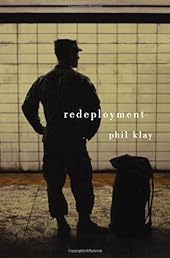
|
Redeployment
|
|||||||||||||||||||||||||||
Buying Choices |
| 33 new from $15.82 |
| 10 used from $16.04 |
| 1 collectible from $34.95 |
(as of 2014-03-10 19:00:26 PST)
Description
Phil Klay's Redeployment takes readers to the frontlines of the wars in Iraq and Afghanistan, asking us to understand what happened there, and what happened to the soldiers who returned. Interwoven with themes of brutality and faith, guilt and fear, helplessness and survival, the characters in these stories struggle to make meaning out of chaos.In "Redeployment", a soldier who has had to shoot dogs because they were eating human corpses must learn what it is like to return to domestic life in suburbia, surrounded by people "who have no idea where Fallujah is, where three members of your platoon died." In "After Action Report", a Lance Corporal seeks expiation for a killing he didn't commit, in order that his best friend will be unburdened. A Morturary Affairs Marine tells about his experiences collecting remains—of U.S. and Iraqi soldiers both. A chaplain sees his understanding of Christianity, and his ability to provide solace through religion, tested by the actions of a ferocious Colonel. And in the darkly comic "Money as a Weapons System", a young Foreign Service Officer is given the absurd task of helping Iraqis improve their lives by teaching them to play baseball. These stories reveal the intricate combination of monotony, bureaucracy, comradeship and violence that make up a soldier's daily life at war, and the isolation, remorse, and despair that can accompany a soldier's homecoming.
Redeployment is poised to become a classic in the tradition of war writing. Across nations and continents, Klay sets in devastating relief the two worlds a soldier inhabits: one of extremes and one of loss. Written with a hard-eyed realism and stunning emotional depth, this work marks Phil Klay as one of the most talented new voices of his generation.
| Check All Offers | Add to WishList | Customer Reviews | Trade-In List |
Editoral Review
An Amazon Best Book of the Month, March 2014: I defy any readers of Phil Klay’s stunning Redeployment to a) put it down and b) limit the number of “wows” they utter while reading it. These twelve stories, are all about the Iraq War or its aftermath; they are so direct, so frank, they will impress readers who have read all they care to about the war as well as those who thought they couldn’t stand to read about it at all. The strength of Klay’s stories lies in his unflinching, un-PC point of view, even for the soldiers he so clearly identifies with and admires. For example, one veteran tells a guy in a bar about a particularly harrowing war experience. When the stranger, moved, declares his respect for our troops, the soldier responds, “I don’t want you to respect what I’ve been through. I want you to be disgusted.” Klay is fearless; he eviscerates platitude and knee-jerk politics every chance he gets. “[A fellow soldier] was the one guy in the squad who thought the country wouldn’t be better off if we just nuked it until the desert turned into a flat plane of grass,” he writes. These stories are at least partly autobiographical, and yet, for all their verisimilitude, they’re also shaped by an undefinable thing called art. Phil Klay is a writer to watch. --Sara Nelson
Book Details | ||||
| Author: Phil Klay | Publisher: Penguin Press HC, .. | Binding: Hardcover | Language: English | Pages: 304 |
Similar Books |
| Fire and Forget: Short Stories from the Long War |
| Blood Will Out: The True Story of a Murder, a Mystery, and a Masquerade |
| Bark: Stories |
| The Enchanted: A Novel |
| Quesadillas: A Novel |
Comments |
Become a fan of Book Presence on Facebook for the inside scoop on latest and most exclusive books.





